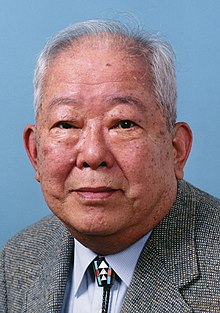Masatoshi Koshiba
Masatoshi Koshiba ( Japanese 小 柴 昌 俊 , Koshiba Masatoshi ; born September 19, 1926 in Toyohashi , Aichi , Japan ) is a Japanese physicist who was awarded the Nobel Prize in Physics in 2002 for “pioneering work in astrophysics , especially for the detection of cosmic neutrinos ” has been.
Life
Koshiba studied at the University of Tokyo . After graduating in 1951, he began his doctorate in Tokyo and moved to the University of Rochester in Rochester , New York in 1953 . In 1955 he received the Ph.D. for his work on ultra-high energy phenomena of cosmic rays .
Koshiba was appointed professor at the University of Tokyo in March 1970. After a guest semester at the University of Hamburg in 1987, he moved to the Tōkai University .
Act
In the 1950s and 60s, Koshiba dealt with high-energy cosmic rays and the interactions it triggered in the upper atmosphere . In the 1970s this led him to muon and neutrino physics as well as to particle physics itself. After participating in JADE, a German-Japanese collaboration at DESY in Hamburg , he designed the Kamiokande detector to detect the proton decay postulated by some theories . Since this detection was not possible, he converted the detector into a neutrino detector and was able to detect cosmic neutrinos for the first time in 1987: During the 1987A supernova , 12 neutrinos were detected in the Kamiokande detector, 9 of them within the first 2 seconds. This was the first direct experimental confirmation of the theories about the processes of star collapse, particularly neutrino cooling.
In 2002 he and Raymond Davis Jr. were awarded half of the Nobel Prize in Physics, the other half going to Riccardo Giacconi .
Awards
- Great Cross of Merit of the Federal Republic of Germany , 1985
- Nishina Foundation Nishina Prize , 1987
- Asahi Prize on behalf of the Kamioka Neutrino Observatory , 1987
- Appointment to Bunka Kōrōsha, person with special cultural merit in 1988
- Academy Award from the Japanese Academy of Sciences , 1989
- Bruno Rossi Prize of the American Physical Society , 1989
- Special Prize of the European Physical Society , 1996
- Humboldt Research Award from the Alexander von Humboldt Foundation , 1997
- Fujiwara Prize from the Fujiwara Science Foundation, 1997
- Japanese Government Cultural Order , 1997
- Diploma di Perfezionamento honoris causa in Fisica from the Scuola Normale Superiole, Pisa, 1999
- Honorary doctorate in natural sciences from the University of Hamburg, 1999
- Rochester's Distinguished Scholar Award from the University of Rochester, 2000
- Wolf Foundation Wolf Prize from the Israeli President, 2000
- Panofsky Prize and Fellow of the American Physical Society , 2002
- Nobel Prize in Physics, 2002
- Appointed Member of the Japanese Academy of Sciences, 2002
- Benjamin Franklin Medal 2003
- Foreign member of the Russian Academy of Sciences in 2003
- Foreign member of the National Academy of Sciences 2005
Web links
- Information from the Nobel Foundation on the 2002 award ceremony for Masatoshi Koshiba
| personal data | |
|---|---|
| SURNAME | Koshiba, Masatoshi |
| ALTERNATIVE NAMES | 小 柴 昌 俊 (Japanese); Koshiba Masatoshi |
| BRIEF DESCRIPTION | Japanese physicist |
| DATE OF BIRTH | September 19, 1926 |
| PLACE OF BIRTH | Toyohashi , Japan |
